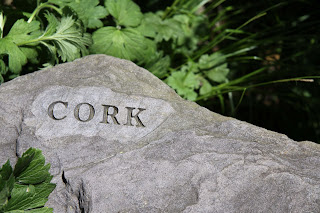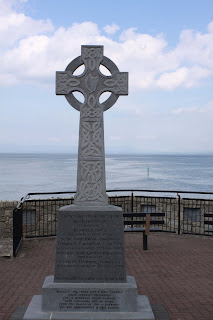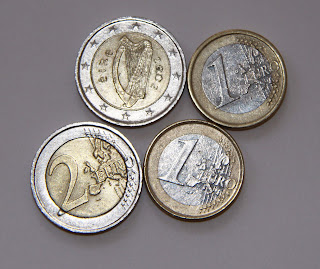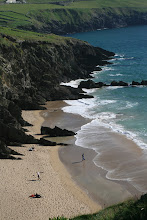Woke up to all the doom and gloom financial news coming from Ireland, but am ending the day with Ceili House, traditional Irish music on RTE 1 Radio.
Each Saturday at 9 p.m. (Irish time), presenter Kieran Hanrahan visits another venue where traditional Irish music is celebrated.
Fiddles and accordions have toes tapping every Tuesday evening at Carberry's Pub (Ti Chairbre) in Drogheda, County Louth, north of Dublin. One fella explained that the tradition began 40 years ago when a few fellas got together to play. Mrs. Carberry thought a music night was a fine idea and it just continued.
Over the radio online it is easy to imagine the coziness of the pub with the damp tweed jackets, the pints of Guinness, the laughter and friends shoulder to shoulder.
A young man, Stuart Carolan, explains that he learned how to sing traditional tunes from his granny. He then sings a capella in such a gorgeous, unselfconscious tenor voice. Several lads sing in unison, "Broken-hearted I will wander...for the loss of my lover" about the "bonny light horseman" who has died and won't be coming home.
What a joy to hear the music and be transported back to Ireland. Sweet dreams.
Saturday, January 21, 2012
Wednesday, November 2, 2011
Irish Are Left the "Good Boys" of Europe
Today the Irish government went ahead with its promise to pay 715 million euro to unguaranteed bondholders of the Irish Bank Resolution Corporation, formerly the infamous Anglo Irish Bank.
Sinn Fein TDs and others in opposition walked out of the Dail, the Irish Parliament, when the body voted down their move to debate whether or not to go ahead with the payments.
Taoiseach Enda Kenny told the TDs that he tried but failed to convince the European Central Bank to permit the "burning" of the bondholders -- paying them back a percentage of the worth of the bonds. Kenny admitted that he does not know the names of any of these bondholders.
Irate callers to afternoon Irish radio shows made the point that some of these speculators bought the bonds at reduced rates, some as low as 20 cents on the euro and will be paid back the full worth of the bonds.
While the Greeks protest in the streets and now their prime minister calls for a referendum as to whether Greece should agree to strict terms of its bailout, the Irish have meekly done the right thing with very little questioning.
A small businessman calling into RTE's Liveline today says shopkeers are "on our knees" while there is money for the bondholders. After 31 years in business, he went to the bank for help and they told him "no." What will happen to him when he loses his business? As a self-employed person he will get no benefits. "They don't give a damn," he said.
Sinn Fein TDs and others in opposition walked out of the Dail, the Irish Parliament, when the body voted down their move to debate whether or not to go ahead with the payments.
Taoiseach Enda Kenny told the TDs that he tried but failed to convince the European Central Bank to permit the "burning" of the bondholders -- paying them back a percentage of the worth of the bonds. Kenny admitted that he does not know the names of any of these bondholders.
Irate callers to afternoon Irish radio shows made the point that some of these speculators bought the bonds at reduced rates, some as low as 20 cents on the euro and will be paid back the full worth of the bonds.
While the Greeks protest in the streets and now their prime minister calls for a referendum as to whether Greece should agree to strict terms of its bailout, the Irish have meekly done the right thing with very little questioning.
A small businessman calling into RTE's Liveline today says shopkeers are "on our knees" while there is money for the bondholders. After 31 years in business, he went to the bank for help and they told him "no." What will happen to him when he loses his business? As a self-employed person he will get no benefits. "They don't give a damn," he said.
Wednesday, June 29, 2011
It's 'Fiver Friday' This Friday
While the Greeks protest harsh economic austerity measures in Athens, the good Irish people are dealing with their own hard times with “Fiver Friday” on July 1.
RTE presenter Joe Duffy suggested that regular punters go out and spend an extra fiver locally on Friday to stimulate the economy. Retailers and service people responded with special offers – a meal, a car wash, a wedding photo, concert tickets, etc. – for a fiver. The offers have flooded the radio station’s phone lines. Two hundred businesses in Mullingar alone are participating.
Fires are burning and tear gas is filling Athens streets. One man explained, “We have the sun, the tourists, some vegetables and olive oil,” and no other industry. There is no way Greece will be able to pay the mammoth debt it has taken on. The cuts to pensions and social services are desperate measures for desperate times.
The threat of the same thing happening in Ireland has been put off only because the Irish people go willingly along with the budget cuts – they complain and call into the talk shows, but very few would come out on the streets like the Greeks.
Hope that Fiver Friday adds a few bob to the pockets of many Irish shopkeepers who are trying to provide for their families in difficult times.
RTE presenter Joe Duffy suggested that regular punters go out and spend an extra fiver locally on Friday to stimulate the economy. Retailers and service people responded with special offers – a meal, a car wash, a wedding photo, concert tickets, etc. – for a fiver. The offers have flooded the radio station’s phone lines. Two hundred businesses in Mullingar alone are participating.
Fires are burning and tear gas is filling Athens streets. One man explained, “We have the sun, the tourists, some vegetables and olive oil,” and no other industry. There is no way Greece will be able to pay the mammoth debt it has taken on. The cuts to pensions and social services are desperate measures for desperate times.
The threat of the same thing happening in Ireland has been put off only because the Irish people go willingly along with the budget cuts – they complain and call into the talk shows, but very few would come out on the streets like the Greeks.
Hope that Fiver Friday adds a few bob to the pockets of many Irish shopkeepers who are trying to provide for their families in difficult times.
Friday, June 10, 2011
May a Courageous Irish Man R.I.P.
Sad news this morning hearing on RTE of the death of Brian Lenihan, former Irish Minister of Finance, who died of cancer today at age 52.
Lenihan learned that he had pancreatic cancer in December 2009, in the midst of the worst economic crisis ever faced by Ireland and perhaps the western economies since the Great Depression. He continued on with both his brief and chemotherapy until his Fianna Fail party was unseated by Fine Gael in February 2011.
He took on the post of Finance Minister in May 2008, shortly before the housing and banking crisis. Under Lenihan the Irish State guaranteed all the Irish banks in September 2008.Who would have been prepared to handle the banking crisis which was itself a worldwide cancer? It was up to Lenihan to put together the massive cuts of the December 7, 2010, brutal budget.
Listening to RTE, the tributes all deem Lenihan to have been a “decent man” of great personal courage and humor who was dedicated to the work he had been given.
This comes in contrast to some politicians in Ireland, the U.S., Italy, etc., who have no personal dignity whatsoever and find themselves embarrassed and on front pages.
Maybe courage and honor and grace are old-fashioned attributes. But when a man or woman lives with courage or honor, people do take notice and mourn the passing of someone good.
Lenihan learned that he had pancreatic cancer in December 2009, in the midst of the worst economic crisis ever faced by Ireland and perhaps the western economies since the Great Depression. He continued on with both his brief and chemotherapy until his Fianna Fail party was unseated by Fine Gael in February 2011.
He took on the post of Finance Minister in May 2008, shortly before the housing and banking crisis. Under Lenihan the Irish State guaranteed all the Irish banks in September 2008.Who would have been prepared to handle the banking crisis which was itself a worldwide cancer? It was up to Lenihan to put together the massive cuts of the December 7, 2010, brutal budget.
Listening to RTE, the tributes all deem Lenihan to have been a “decent man” of great personal courage and humor who was dedicated to the work he had been given.
This comes in contrast to some politicians in Ireland, the U.S., Italy, etc., who have no personal dignity whatsoever and find themselves embarrassed and on front pages.
Maybe courage and honor and grace are old-fashioned attributes. But when a man or woman lives with courage or honor, people do take notice and mourn the passing of someone good.
Friday, June 3, 2011
Visit the Irish Hunger Memorial in NYC

 For years, I knew there was an Irish Hunger Memorial set in Lower Manhattan, but hadn't made the journey to see it until yesterday.
For years, I knew there was an Irish Hunger Memorial set in Lower Manhattan, but hadn't made the journey to see it until yesterday.I found a small corner of Ireland in Battery Park City at Vesey Street and North End Avenue. Here artist Brian Tolle created on a half acre a living reminder of the Irish Famine of 1845-52, "An Gorta Mor," an event which brought many, including my own great-grandmother, from Ireland to the U.S.
At the heart of the monument is a derelict Famine-era fieldstone cottage, which was brought from County Mayo and reconstructed on the site. A winding path circles small fields dotted with native Irish plants including bearberry, blackthorn, burnet rose, foxglove, gorse and heather. The yellow flag irises were just a few days past blooming.
Set along the pathways are 32 large stones, each one etched with name of one of the Irish counties. You can easily find Cork, Kerry, Tyrone, Monaghan and Armagh. Other names hide under grass or at the sides of stones.
The entire memorial is supported by a limestone plinth and overlooks a small fountain pond and the boat traffic on the Hudson River.
Quotations from Irish texts and authors encircle the outside wall of the base of the memorial. More text on the Famine times lines the walls of the passageway entrance to the memorial. Listen carefully to hear the audio presentation about world hunger during the short walk.
There was no signage on the nearby streets directing to the memorial, but the site should call to the naturally curious. The gorse was not in bloom yet, so I will have to go back to see the profusion of yellow that promises.
Tuesday, May 24, 2011
The Message in Dublin Was No More Negativity

After much anticipation, President Barack Obama made a triumphant visit to Moneygall, Ireland, the home of his ancestor, Fullmouth Kearney.
RTE presenters were thrilled to see him and the first lady spending 45 minutes walking the length of Moneygall shaking hands and kissing babies of the 300 residents of the County Offaly village. "These pictures will be seen throughout the world tonight," they swooned. They dreamt of the tourists who might come over this summer as a result.
But news is always ruled by timing and unfortunately the main story on our news pages, websites and early morning shows today was the devastating tornado in Joplin, Missouri.
A short wrap-up and photo of Obama drinking a pint of Guinness was on page 6 of The New York Times. The evening news featured only about 30 seconds about the Irish visit. Not enough coverage to see how the Irish, who have been on their knees in this recession, were finally given something to be proud about.
There was no coverage of Taoiseach Enda Kenny's powerful speech in Dublin introducing Obama to a crowd of more than 25,000 in College Green. This was hardly recognizable as the same Enda Kenny who was shielded from opening his mouth too much in the recent elections and debates.
President Obama told the crowd, "Is feidir linn," in Irish, "Yes, we can." It was a day that gave the Irish something to cheer about, which they haven't had in several years.
Monday, May 9, 2011
Morgan Kelly Predicts Bankruptcy for Ireland
 How often does a newspaper op-ed piece elicit reaction that becomes news in itself?
How often does a newspaper op-ed piece elicit reaction that becomes news in itself?Yesterday, Ireland’s Governor of the Central Bank, Patrick Honohan, responded to an article by Morgan Kelly in The Irish Times (May 7, 2011) in which Kelly said, “Honohan’s miscalculations of the bank losses has turned out to be the costliest mistake ever made by an Irish person.”
Kelly is a professor of economics at University College Dublin and is credited with having predicted the Irish property crash.
“With the Irish Government on track to owe a quarter of a trillion euro by 2014, a prolonged and chaotic national bankruptcy is becoming inevitable,” Kelly said in his Times piece. “Ireland is facing economic ruin.”
“While most people would trace our ruin to to [sic] the bank guarantee of September 2008,” he explains, “the real error was in sticking with the guarantee long after it had become clear that the bank losses were insupportable.”
Finance Minister Brian Lenihan’s mistake in guaranteeing most of the bonds of Irish banks…was “obvious” and ridiculous,” Kelly said. A few months later, Patrick Honohan was appointed Governor of the Central Bank….and had the opportunity to reverse Lenihan. But instead, Honohan deemed the bank losses to be “manageable.” Honohan “appeared to believe that Ireland was still the export-driven powerhouse of the 1990s, rather than the credit-fueled Ponzi scheme it had become since 2000….,” Kelly said.
Honohan went over Lenihan’s head and stated on November 18 on RTE Radio 1 “that Ireland would need a bailout of tens of billions”. “Rarely has a finance minister been so deftly sliced off at the ankles by his central ban k governor,” Kelly said. “And so the Honohan Doctrine that bank losses could and should be repaid by Irish taxpayers ran its predictable course with the financial collapse and international bailout of the Irish State.”
Kelly says that the IMF “presented the Irish with a plan to haircut €30 billion of unguaranteed bonds by two-thirds on average. Lenihan was overjoyed, according to a source who was there, telling the IMF team: ‘You are Ireland’s salvation’.”
Kelly says the “haircut was vetoed by U.S. treasury secretary Timothy Geithner who, as his payment of €13 billion from government owned AIG to Goldman Sachs showed, believes that bankers take priority over taxpayers.”
Kelly concludes, “…the IMF was forced by the obduracy of Geithner and the spinelessness, or worse, of the Irish to lend their imprimatur, €30 billion of their capital, to a deal that its negotiators privately admit will end in Irish bankruptcy.”
Kelly writes, “Back when the euro was being planned in the mid-1990s, it never occurred to anyone that cautious, stodgy banks like AIB and Bank of Ireland, run by faintly dim former rugby players, could ever borrow tens of billions overseas, and lose it all on dodgy property loans.”
Kelly predicts “Ireland’s government debt will top €190 billion by 2014, with another €45 billion in Nama and €35 billion in bank recapitalization, for a total of €270 billion”…this for a country of only about 4 million people, half the population of New York City, and with a reported 100,000 planning to leave the country this year. The bill comes to about €120,000 per Irish worker, Kelly says, or “60 per cent larger than GNP.”
As a result, Kelly reports, “the banks that lent to the Irish Government are at risk of losing most of what they lent. In other words, the Irish banking crisis has become part of the larger European sovereign debt crisis.”
Kelly says that government default of its debt would be for Ireland “that trades on its reputation as a safe place to do business, a bankruptcy would be catastrophic.”
Kelly says that Ireland’s national survival requires that “Ireland walk away from the bailout. This in turn requires the Government to do two things: disengage from the banks, and bring its budget into balance immediately.”
Kelly predicts that the current Fine Gael Government won’t follow his advice and that the result will be bankruptcy. Fine Gael and Labour will fall into disrepute and the next election, “after the trauma and chaos of the bankruptcy” will be nothing like the “dull and predictable” one that took down Fianna Fail.
At such a juncture for Irish society, one would hope there is someone at the helm with training in economics and not just smiling and back-slapping. The ship is getting very close to the edge of the earth.
Subscribe to:
Posts (Atom)
